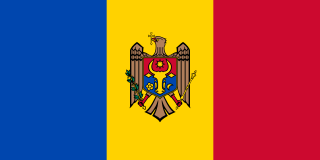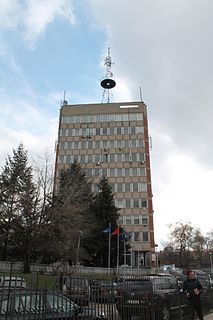The media of Romania refers to mass media outlets based in Romania. Television, magazines, and newspapers are all operated by both state-owned and for-profit corporations which depend on advertising, subscription, and other sales-related revenues. The Constitution of Romania guarantees freedom of speech. As a country in transition, the Romanian media system is under transformation.
The media of Belarus are mass-media outlets based in Belarus. Television, magazines, and newspapers are operated by state-owned and for-profit corporations and depend on advertising, subscriptions, and other sales-related revenue. The Constitution of Belarus guarantees freedom of speech, but this is contradicted in practice by repressive and restrictive laws. Arbitrary detention, arrests, and harassment of journalists are frequent in Belarus. Anti-extremism legislation targets independent journalism, including material considered unfavourable to the president.
Concentration of media ownership is a process whereby progressively fewer individuals or organizations control increasing shares of the mass media. Contemporary research demonstrates increasing levels of consolidation, with many media industries already highly concentrated and dominated by a very small number of firms.
The media of Sweden has a long tradition going back to the 1766 law enacting freedom of the press.
The media of Turkey includes a wide variety of domestic and foreign periodicals expressing disparate views, and domestic newspapers are extremely competitive. However, media ownership is concentrated in the hands of a few large private media groups which are typically part of wider conglomerates controlled by wealthy individuals, which limits the views that are presented. In addition, the companies are willing to use their influence to support their owners' wider business interests, including by trying to maintain friendly relations with the government. The media exert a strong influence on public opinion. Censorship in Turkey is also an issue, and in the 2000s Turkey has seen many journalists arrested and writers prosecuted. On Reporters Without Borders' Press Freedom Index it has fallen from being ranked around 100 in 2005 to around 150 in 2013.
The media of Georgia refers to mass media outlets based in the Republic of Georgia. Television, magazines, and newspapers are all operated by both state-owned and for-profit corporations which depend on advertising, subscription, and other sales-related revenues. The Constitution of Georgia guarantees freedom of speech. Georgia is the only country in its immediate neighborhood where the press is not deemed unfree. As a country in transition, the Georgian media system is under transformation.
The media of Transnistria, the breakaway territory within the borders of Moldova, features both state-owned or supported outlets and opposition media. Publications are in Russian, with a single newspaper in each of the other two official languages, Moldovan (Romanian), and Ukrainian. Allegations of propaganda have emerged internationally.
Media in Pakistan provides information on television, radio, cinema, newspapers, and magazines in Pakistan. Pakistan has a vibrant media landscape; among the most dynamic in South Asia. Majority of media in Pakistan is privately owned. Pakistan has around 300 privately owned daily newspapers. According to the Pakistan Bureau of Statistics, they had a combined daily sale of 6.1 million copies in 2009. Television is the main source of news and information for people in Pakistan's towns, cities and large areas of the countryside. Marketing research company Gallup Pakistan, estimated there were 86 million TV viewers in Pakistan in 2009.
The media of Armenia refers to mass media outlets based in Armenia. Television, magazines, and newspapers are all operated by both state-owned and for-profit corporations which depend on advertising, subscription, and other sales-related revenues. As of 2018, there were few indicators of a healthy and independent media.
The media of Bulgaria refers to mass media outlets based in Bulgaria. Television, magazines, and newspapers are all operated by both state-owned and for-profit corporations which depend on advertising, subscription, and other sales-related revenues. The Constitution of Bulgaria guarantees freedom of speech. As a country in transition, Bulgaria's media system is under transformation.

The media of Croatia refers to mass media outlets based in Croatia. Television, magazines, and newspapers are all operated by both state-owned and for-profit corporations which depend on advertising, subscription, and other sales-related revenues. The Constitution of Croatia guarantees freedom of speech and Croatia ranked 63rd in the 2016 Press Freedom Index report compiled by Reporters Without Borders, falling by 5 places if compared to the 2015 Index.
The media of Greece refers to mass media outlets based in the Republic of Greece. Television, magazines, and newspapers are all operated by both state-owned and for-profit corporations which depend on advertising, subscription, and other sales-related revenues. The Constitution of Greece guarantees freedom of speech.
Before the independence from the Soviet Union (USSR) in 1990, Lithuanian print media sector served mainly as a propaganda instrument of the Communist Party of Lithuania (LKP). Alternative and uncontrolled press began to appear in the country starting from 1988, when the Initiative Group of the Reform Movement of Lithuania Sąjūdis was established. After the declaration of independence the government stopped interfering in the media outlets which for the most part were first privatised to their journalists and employees and later to local businessman and companies. Currently media ownership in Lithuania is concentrated among a small number of domestic and foreign companies.

The media of Moldova refers to mass media outlets based in the Republic of Moldova. Television, magazines, and newspapers are all operated by both state-owned and for-profit corporations which depend on advertising, subscription, and other sales-related revenues. The Constitution of Moldova guarantees freedom of speech. As a country in transition, Moldova's media system is under transformation.
The media of Russia refers to mass media outlets based in the Russian Federation. The media of Russia is diverse, with a wide range of broadcast and print outlets available to the consumers. Television, magazines, and newspapers are all operated by both state-owned and for-profit corporations which depend on advertising, subscription, and other sales-related revenues. Even though the Constitution of Russia guarantees freedom of speech the country is plagued by both government and self-censorship. As a country in transition, Russia's media system is under transformation.
The media of Serbia refers to mass media outlets based in Serbia. Television, magazines, and newspapers are all operated by both state-owned and for-profit corporations which depend on advertising, subscription, and other sales-related revenues. The Constitution of Serbia guarantees freedom of speech.
The media of Ukraine refers to mass media outlets based in Ukraine. Television, magazines, and newspapers are all operated by both state-owned and for-profit corporations which depend on advertising, subscription, and other sales-related revenues. The Constitution of Ukraine guarantees freedom of speech. As a country in transition, Ukraine's media system is under transformation.
The media of Syria consists primarily of television, radio, Internet, film and print. The national language of Syria is Arabic but some publications and broadcasts are also available in English and French. While television is the most popular medium in Syria, the Internet has become a widely utilized vehicle to disseminate content. Transcending all available media, the government seeks to control what Syrians see by restricting coverage from outside sources. Publications and broadcasts are monitored by members of the government. Syria is ranked as one of the most dangerous places in the world for journalists. There were 28 journalists killed in combat in 2012.

The Media of Kosovo consists of different kinds of communicative media such as radio, television, newspapers, and internet web sites. Most of the media survive from advertising and subscriptions.
The Media of the Czech Republic refers to mass communication methods through broadcasting, publishing, and the Internet.


